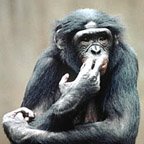Steal this book!
For those who don't know the name, Bone was one of the prime movers of the Class War anarchist group, active in the 1980's. Anyone with in the UK who was at all involved in protest politics will have had at least a passing knowledge of this group. They could be seen, menacing black flags held aloft and usually surrounded by police, at all the major demonstrations. They had a something of a reputation as nihilistic troublemakers, equally ready to have a pop at trendy lefties as at Thatcher's blue legions. I've nothing against political violence, properly applied, so I approached the book with a desire to hear things from their point of view, to understand something of their political philosophy.
Jaysus, but it's one piss-poor book. Let's deal with the editing first. I'll admit that I'm as prone to error as anyone and I can't proof read for shit - but that someone is actually credited as having edited this book defies the imagination. There are numerous repetitions. It would probably been useful to settle on a single spelling for 'Alsation' (they only get it right twice). And some basic fact checking, puh-lease! Like a slightly more accurate account of the start of the Brixton Riots.
So on to Bone. He explicitly states that he and his comrades were uninterested in political philosophy (although he's happy enough to parade his erudition with references to Bakhunin, Makhno, Durutti and...er...Wilhelm Reich), concentrating instead on direct action and agitation. Yes, we all bought Class War from time to time. We all gasped in amazement/ had a giggle at the 'Hospitalised Copper' feature. But what did the Class War group actually achieve. Did they radicalise the miners*? Are you kidding?! Did they galvanise the inner cities? I suggest not. Indeed, in the case of the miners, I suggest that far more practical good was done by the support groups organised by the very groups that Bone would have despised as ineffective. So by Bone's own account, their remaining contribution to The Struggle seems to stand at the (admittedly amusing) Situationism of Henley; a couple of hopelessly disorganised 'Bash the Rich' marches which singularly failed to leave the affluent quaking in their boots; some minor skirmishing on the fringes of the Second Brixton Insurrekshan (and why do I have the feeling their contribution may have been over-glamorised?)...and some low-level bonfire night rowdyism (eg stoving in the windows of Cancer Research and Oxfam shops. Ooh. Scary.) of the sort that occurs in any British town on that night of the year.
And yet through all of this, Bone appears to maintain the self-delusion that he was at the political focal point of opposition to Thatcherism - not just a bit of a waster with strictly limited analytical powers who liked a bit of a ruck. Not too much of a ruck, though. Class war activities were curtailed following the killing of PC Keith Blakelock, when Bone realised that the Hospitalised Copper feature - er - might not be seen in a sympathetic light. In Paul Weller's words, he was "...Left there standing like a guilty schoolboy". I'm wondering whether he has an inkling of the contradictions and inconsistencies of the book? Violence is necessary...unless it can get you into trouble. Class War are not the macho group they're portrayed...because they sometimes have woman speakers. The comic-0pera Free Wales Army, with whom Bone had a minor association were not laughable crypto-fascists with a uniform fetish...because some of them turned out to be lefties. Sexual liberation is centrally important to anarchism...but it's still acceptable to make what amounts to "backs to the wall, boys" comments in your books. My overall impression is that what is politically important Bone is whatever he and his immediate circle are thinking at the time. The example that really stood out for me was when, after repeatedly decrying the trendy-lefty interest in overseas struggles, he praises his father for a article, written in the early 1960s, in which he highlights the anti-Apartheid struggle and the murder of Rudi Dutschke. His father was an activist for that well-known revolutionary organisation, The Labour Party.
Now admittedly Class War were prominent. They were highly visible in the politicised 1980's (let's face it - who wasn't radicalised by Thatcher?) . I suggest, though, that that they were part of the zeitgeist, but far from the vanguard. On the basis of this self-aggrandising book by a political peabrain, they contributed little. The front cover displays a spook PMRC sticker reading "This book contains strong language and dangerous ideas". To the first part - what a fucking pathetic little twat. To the second - like fuck it does. If you're interested in Anarchist ideas - look elsewhere.
*In fairness, he admits this at one point. On the other hand - he bangs on endlessly about how successful Class War sales were in South Yorkshire. Note that the paper's most notorious feature, those coppers were being hospitalised by already radicalised miners. The anarchists were merely printing their souvenir snaps.




